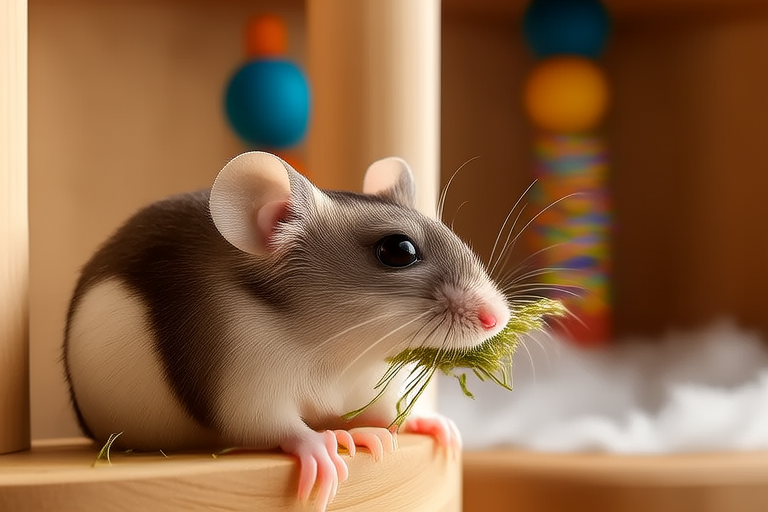Fancy Rats: The Ultimate Guide to Keeping Your Pet Happy and Healthy
Welcome to the ultimate guide to keeping your fancy rat happy and healthy! This comprehensive resource covers everything from essential care tips to dietary needs, housing requirements, exercise recommendations, grooming practices, common health issues, and signs of a happy and healthy rat. Additionally, we will provide advice on socializing, enrichment activities, and selecting appropriate toys for fancy rats. Whether you’re a new or experienced pet owner, this guide will equip you with the knowledge necessary to ensure your furry friend leads a long, healthy, and joyful life.
Essential Care Tips
Caring for a fancy rat requires attention to detail and consistent effort. Here are some essential tips to keep your pet thriving:
- Regular Check-Ups: Schedule routine visits with a veterinarian who specializes in small animals. Early detection of health issues can significantly improve outcomes.
- Safe Environment: Ensure that your rat’s living space is free from hazards such as toxic plants, small objects that could be swallowed, and sharp edges.
- Hygiene: Clean the cage at least once a week, replacing bedding and cleaning all accessories. Regularly wash food and water bowls to prevent bacterial growth.
- Handling: Always support your rat’s body when picking it up to avoid injury. Start handling sessions slowly and gently to build trust.
Dietary Needs
Proper nutrition is crucial for maintaining your rat’s overall health. A balanced diet should include:
- Commercial Rat Food: High-quality pellets designed specifically for rats provide essential nutrients.
- Fruits and Vegetables: Offer fresh fruits and vegetables as occasional treats. Rotate options to offer variety and prevent boredom.
- Treats: Limit treats to no more than 10% of your rat’s daily intake to avoid obesity. Opt for healthy options like small pieces of cooked chicken or scrambled eggs.
- Water: Fresh, clean water should always be available. Consider using a sipper bottle to reduce the risk of spills.
Housing Requirements
Creating a comfortable and safe home for your fancy rat is vital. Consider the following:
- Size: Provide ample space for your rat to move around freely. A minimum cage size of 24×12 inches per rat is recommended.
- Material: Opt for a wire-bottom cage with solid flooring to prevent foot injuries. Line the cage with soft bedding material such as fleece or paper-based products.
- Temperature: Maintain a temperature between 68-79°F (20-26°C) to ensure comfort. Avoid extreme temperatures, drafts, and direct sunlight.
- Accessories: Include tunnels, hammocks, and chewable items to stimulate mental and physical activity.
Exercise Recommendations
Regular exercise is important for your rat’s well-being. Encourage physical activity through:
- Playtime Outside the Cage: Supervised playtime allows rats to explore and burn off excess energy. Use a secure area free from hazards.
- Running Wheels: Install a large, solid-surface running wheel to promote cardiovascular health. Ensure the wheel is securely attached and free from wobbling.
- Interactive Toys: Rotate toys regularly to prevent boredom and encourage exploration. Puzzle feeders and treat-dispensing toys are excellent choices.
Grooming Practices
While rats are generally self-grooming, occasional assistance can help maintain their hygiene:
- Bathing: Bathe your rat only when necessary, using a gentle, unscented shampoo. Avoid over-bathing, which can strip natural oils from their skin.
- Nail Trimming: Trim nails every few weeks to prevent overgrowth. Use a pair of small animal nail clippers and be cautious not to cut into the quick.
- Tooth Care: Rats’ teeth continuously grow. Provide chew toys to help them wear down their teeth naturally.
Common Health Issues
Understanding potential health problems can help you identify and address issues early:
- Respiratory Infections: Symptoms include sneezing, wheezing, and discharge from the nose or eyes. Seek veterinary care immediately.
- Obesity: Monitor your rat’s weight and adjust its diet accordingly. Exercise is also essential in preventing obesity.
- Diarrhea: Diarrhea can lead to dehydration and other complications. Consult a vet if symptoms persist for more than 24 hours.
- Misaligned Teeth: Overgrown or misaligned teeth can cause discomfort and difficulty eating. Regular dental check-ups are crucial.
Signs of a Happy and Healthy Rat
A content and healthy rat exhibits certain behaviors and physical traits:
- Behavior: Active, curious, and playful. They may investigate new objects and engage in social interactions with humans and other rats.
- Appearance: Well-groomed fur, clear eyes, and clean ears. Their coat should be shiny and free from bald patches or dandruff.
- Eating Habits: Consistent appetite and regular bowel movements. Sudden changes in eating habits may indicate underlying health issues.
Socializing and Enrichment Activities
Rats are social creatures that thrive on interaction and mental stimulation:
- Handling: Spend time handling your rat daily to build a bond. Start with short sessions and gradually increase duration.
- Interaction: Introduce your rat to family members and friends, ensuring everyone handles the rat gently and respectfully.
- Enrichment: Provide opportunities for mental and physical stimulation. Hide treats, introduce new toys, and rearrange cage accessories periodically.
Selecting Appropriate Toys for Fancy Rats
Choosing the right toys is essential for keeping your rat entertained and engaged:
- Chew Toys: Offer wooden blocks, cardboard tubes, and safe ropes to satisfy their chewing instincts.
- Puzzle Feeders: These toys challenge your rat to find hidden treats, promoting problem-solving skills.
- Tunnels and Platforms: Create an obstacle course with tunnels, platforms, and bridges to encourage exploration.
- Soft Balls: Soft, lightweight balls allow your rat to roll and play without the risk of injury.
In conclusion, fancy rats make wonderful companions with proper care and attention. By following the guidelines outlined in this guide, you can ensure your pet leads a long, healthy, and joyful life. Remember, the key to a happy and healthy rat lies in providing a loving environment, nutritious diet, and plenty of mental and physical stimulation. With dedication and commitment, you’ll have a loyal and affectionate friend by your side for years to come.
